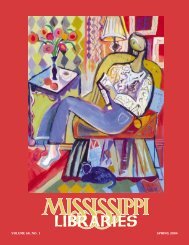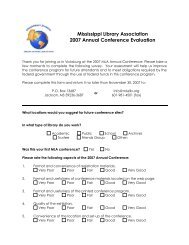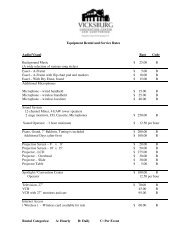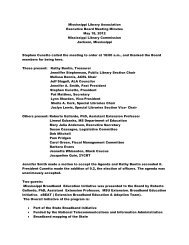Full Text (PDF) - Mississippi Library Association
Full Text (PDF) - Mississippi Library Association
Full Text (PDF) - Mississippi Library Association
Create successful ePaper yourself
Turn your PDF publications into a flip-book with our unique Google optimized e-Paper software.
Page 85 Vol. 69, No. 4, Winter 2005 <strong>Mississippi</strong> Libraries<br />
Writing an Accessibility Policy:<br />
One <strong>Library</strong>’s Experience<br />
Elizabeth Stephan<br />
Editor, <strong>Mississippi</strong> Libraries<br />
Business Reference Librarian<br />
JD Williams <strong>Library</strong><br />
The University of <strong>Mississippi</strong><br />
ABSTRACT<br />
Writing an accessibility policy may<br />
not be at the top of the list of things to<br />
do, but it will let patrons know your<br />
librarians and staff can and will accommodate<br />
patrons with disabilities. Writing<br />
an accessibility policy isn’t as difficult as<br />
it may seem. Using resources developed<br />
by ALA and viewing policies from other<br />
libraries can make it much easier and<br />
less time consuming. The University of<br />
<strong>Mississippi</strong> implemented a disability policy<br />
in the Fall of 2004 after it became<br />
clear that patrons with disabilities didn’t<br />
know who to contact when they needed<br />
assistance in the library.<br />
In 2004 several University of <strong>Mississippi</strong><br />
librarians met with the Office of Student<br />
Disability Services to discuss library<br />
services to students with disabilities.<br />
Some issues that were touched on were<br />
signage problems (lettering too small),<br />
photocopying services, and retrieval of<br />
books from shelves that were too high. It<br />
had been reported that some patrons<br />
didn’t know where to go for assistance<br />
when it was needed, and those of us in<br />
the meeting realized that we didn’t know<br />
who to go to when someone needed<br />
assistance, either. This is when we realized<br />
we needed an accessibility policy.<br />
The policy could be distributed within the<br />
library letting all employees know which<br />
areas were responsible for what. It could<br />
also be distributed to students through<br />
Disability Services, letting them know that<br />
the library would accommodate their<br />
needs.<br />
An accessibility committee was<br />
formed of people from different areas of<br />
the library: reference, access services/circulation,<br />
the science library, systems, and<br />
government documents/media-microforms.<br />
The committee was to write an<br />
accessibility policy that would make all<br />
services available to our users.<br />
WHERE TO START?<br />
What exactly is an accessibility policy?<br />
According to ALA’s Office for Information<br />
Technology Policy (OITP), “[a] well-drafted<br />
policy identifies how the library intends<br />
to accommodate the needs of patrons<br />
with disabilities and establish specific procedures<br />
for responding to requests in a<br />
timely manner.” (http://www.ala.org/<br />
ala/washoff/oitp/emailtutorials/accessibilitya/22.htm).<br />
The first thing we needed to do was<br />
figure out what we wanted to include in<br />
our policy. We did this by looking at<br />
other university accessibility polices.<br />
Using ALA’s Office for Information Technology<br />
Policy (OITP) Web page, we<br />
found several policies to use as examples.<br />
The section titled “Creating an Accessibility<br />
Policy” was the most useful to us<br />
when we were developing our policy. The<br />
points we found most helpful were:<br />
• Make sure all participants<br />
(patrons, staff, etc.) are covered<br />
by the policy<br />
• Review existing policies at other<br />
institutions<br />
• Develop a broad policy that<br />
commits the library to making all<br />
programs accessible to patrons<br />
with disabilities<br />
• Disseminate plan throughout the<br />
library, and in our case, to the<br />
Office of Student Disabilities<br />
We reviewed policies listed on the<br />
ALA site: South Carolina State University<br />
(http://www.state.sc.us/scsl/policies.<br />
html), The University of Texas at Austin<br />
(http://www.lib.utexas.edu/services/<br />
assistive/policy.html), and University of<br />
Waterloo (http://www.lib.uwaterloo.ca/<br />
News/UWLibDocs/access/).<br />
We wanted something that would act<br />
as a guide to students with disabilities;<br />
something that would instruct them where<br />
to go and who to ask when they needed<br />
assistance. Of the three policies we<br />
viewed, University of Texas’ policy was<br />
the most like what we wanted. Because<br />
we saw no need to re-invent the wheel,<br />
we took UT’s policy and adapted it to our<br />
libraries and our services.<br />
All public service areas – Circulation,<br />
Reference, Government Documents,<br />
Special Collections and Archives, and<br />
<strong>Library</strong> Instruction – were considered<br />
when developing the policy. We kept the<br />
same basic organization that UT had and<br />
altered it to fit our needs. We focused in<br />
on several areas: Policy Statement, Physical<br />
Facilities, Services for Accessing Electronic<br />
Information, Services for Accessing<br />
Print Materials, Reference Services,<br />
<strong>Library</strong> Instruction, Borrowing Materials,<br />
Interlibrary Loan, and Copying Services.<br />
We made sure every aspect of public service<br />
was covered and that there was a<br />
contact person for every area of the<br />
library. This meant going to every department<br />
head to discuss what would be said<br />
in the policy, as well as what they could<br />
do to help someone who needed assistance.<br />
Everyone involved with the project<br />
– both department heads and members of<br />
the committee – worked hard and made<br />
sure everything that needed to be discussed<br />
was discussed.<br />
We tried to include every service a<br />
student might need when visiting the<br />
library: photocopying, book retrieval,<br />
viewing videos, using computers, etc. If<br />
there was a service we thought might be<br />
needed but we were not able to provide,<br />
we said that. Some services that were normally<br />
not provided to students were<br />
changed to accommodate users with disabilities,<br />
such as Proxy card availability.<br />
Currently, faculty can get a proxy card for<br />
their student assistants so students can<br />
check out materials for professors without<br />
using their student IDs. We made sure<br />
proxy cards would be available to students<br />
with disabilities thus allowing someone to<br />
check out materials for them if they are<br />
unable to get to campus. Interlibrary Loan<br />
said they would borrow books in alternate














